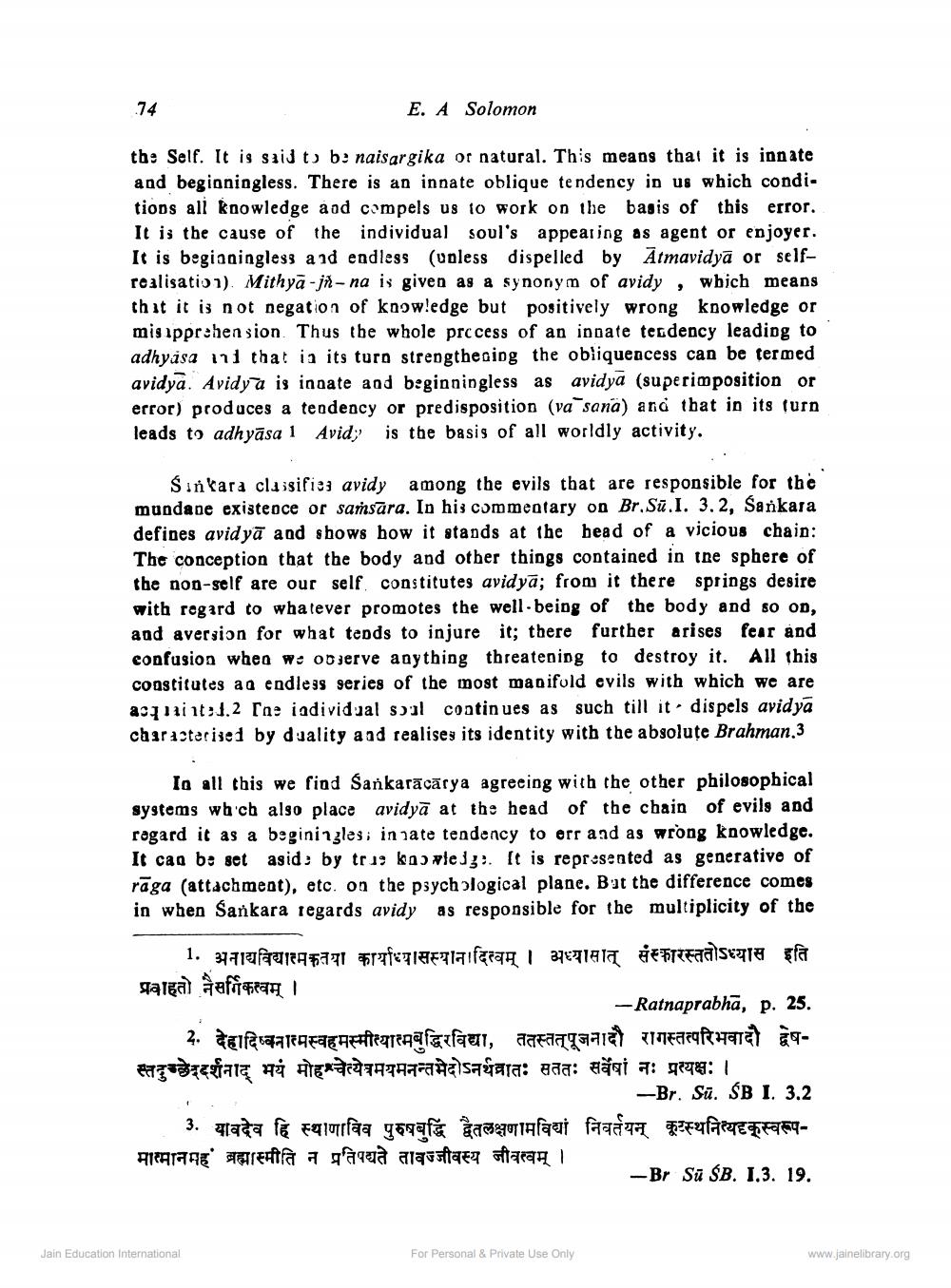________________
.74
E. A Solomon
th: Self. It is said to b: naisargika or natural. This means that it is innate and beginningless. There is an innate oblique tendency in us which conditions all knowledge and compels us to work on the basis of this error. It is the cause of the individual soul's appearing as agent or enjoyer. It is beginningless and endless (upless dispelled by Atmavidyā or selfrealisation). Mithya -jn-na is given as a synonym of avidy, which means that it is not negation of know!edge but positively wrong knowledge or misapprehension. Thus the whole process of an innate tendency leading to adhyasa in that in its turn strengthening the obliquencess can be termed avidya. Avidya is ingate and beginningless as avidya (superimposition or error) produces a tendency or predisposition (va sana) and that in its turn leads to adhyāsa 1 Avid; is the basis of all worldly activity.
Sinkara classifiez avidy among the evils that are responsible for the mundane existence or saṁsāra. In his commentary on Br. Sū.I. 3.2, Sankara defines avid yā and shows how it stands at the head of a vicious chain: The conception that the body and other things contained in the sphere of the non-self are our self constitutes avidyā; from it there springs desire with regard to whatever promotes the well-being of the body and so on, and aversion for what tends to injure it; there further arises fear and confusion when we observe anything threatening to destroy it. All this constitutes an endless series of the most manifold evils with which we are asuinto.2 Cae iadividual sal coatinues as such till it dispels avidya characterised by duality and realises its identity with the absolute Brahman.3
Io all this we find Sankarācārya agreeing with the other philosophical systems which also place avidyā at the head of the chain of evils and rogard it as a begininglesi in sate tendency to orr and as wrong knowledge. It can be set asid: by trug karle 13. It is represented as generative of rāga (attachment), etc. on the psychological plane. Bat the difference comes in when Sarkara tegards avidy as responsible for the multiplicity of the
___1. अनाद्यविद्यात्मकतया कार्याध्यासस्यानादित्वम् । अध्यासात् संस्कारस्ततोऽध्यास इति प्रवाहतो नैसर्गिकत्वम् ।
- Ratnaprabhā, p. 25. 2. देहादिष्वनात्मस्वहमस्मीत्यात्मबुद्धिरविद्या, ततस्तत्पूजनादौ रागस्तत्परिभवादी द्वेषस्तदुग्छेददर्शनाद् भयं मोहम्चेत्येवमयमनन्तभेदोऽनर्थव्रातः सततः सर्वेषां नः प्रत्यक्षः ।
-Br. Sū. SB I. 3.2 3. यावदेव हि स्थाणाविव पुरुषबुद्धिं द्वैतलक्षणामविद्यां निवर्तयन् कूटस्थनित्यदृक्स्वरूपमात्मानमह ब्रह्मास्मीति न प्रतिपद्यते तावज्जीवस्य जीवत्वम् ।
-Br Su SB. 1.3. 19.
Jain Education International
For Personal & Private Use Only
www.jainelibrary.org




